#Python +Statistics & Probability
Explore tagged Tumblr posts
Text
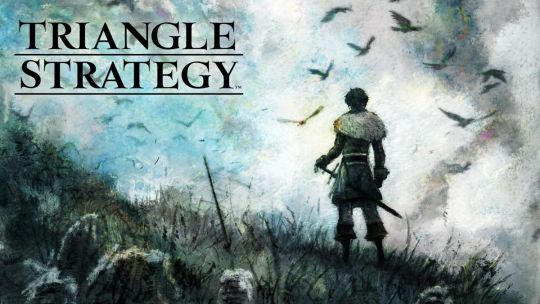
Overall Tournament Results
Here's a deeper dive into the tournament results and how each contestant fared! These results don't include the bonus polls, and in cases where two contestants moved on together (Benedict and Orlaea, Julio and Jens) I split their votes between them so that each received half.
I'll be doing some traveling soon so I probably won't start a new tournament right away, but I'm loosely planning to do another one sometime in the future. So feel free to stick around if you're interested, and either way, thanks again to everyone for participating! Running this has really been awesome, and I loved seeing everyone's thoughts on all the different characters. Until next time! :)
Highlights
Character with the most votes across all polls:
Frederica (200 votes)
Poll with the most votes:
Cats vs. Frederica (78 total votes)
Character with the fewest votes across all polls:
Zigmunt: (1 vote) tied with
Kamsell: (1 vote)
Poll with the fewest votes:
Frani vs. Thalas (21 votes)
Biggest smackdown:
Zigmunt vs. Orlaea (1 vote/41 votes or a 2.4%/97.6% difference)
Polls that ended in a tie:
Benedict vs. Orlaea
Jens vs. Julio
Honorable Mention:
Roland! As I was going through the numbers, I noticed that despite not making it to the semifinals let alone the finals, Roland earned third in terms of total votes, and 3/4 of Roland's polls that he was in were included in the top 5 most-voted polls. In terms of votes per poll, Roland was the most voted-on character.
All Results
All characters and their cumulative votes across all polls:
Link to spreadsheet with full results
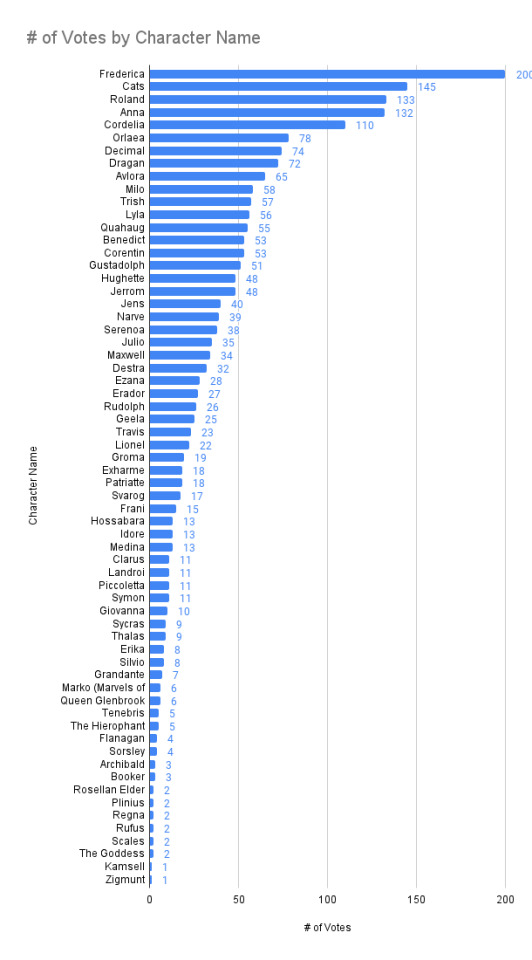
All polls and their number of total votes:
Link to spreadsheet with full results
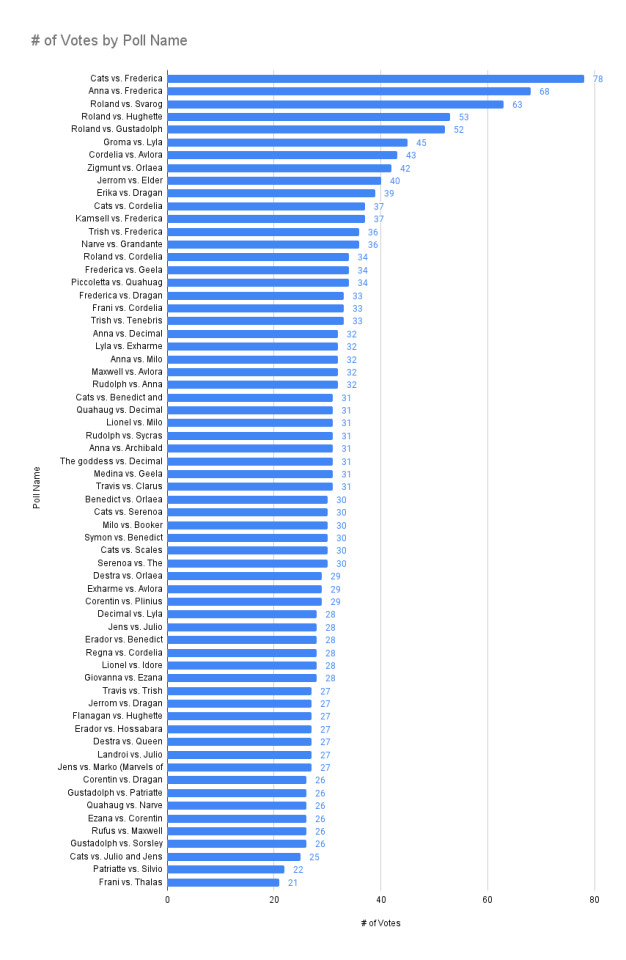
#triangle strategy#polls#results#statistics#this data is brought to you by a python script I slapped together at 2am + some scraped json responses#so although I did some spot checks afterwards that looked fine#it's possible some mistakes still snuck in somewhere#also! just wanted to throw out a blanket statement that#anyone is welcome to run their own tournament using the ideas I mentioned on the interest check#it probably goes without saying but just wanted to make it clear I didn't mean to put a claim on them or anything#especially since it might be a second before I start another one up
5 notes
·
View notes
Text
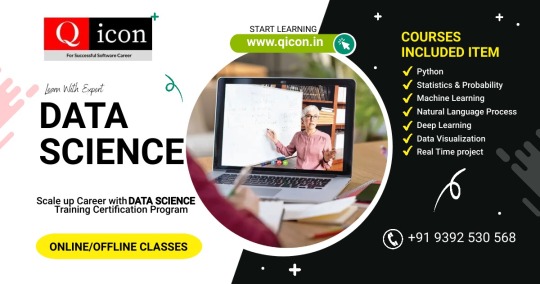
Qicon Provides Data Science Course Training with real time project .We also provide interview questions for data science.ML python stats tableau datamining sql bigdata Ml deployment & flask api
#classroom training#online training#interview questions#demo video#concepts#project training#live classses#Python +Statistics & Probability#Machine Learning#Natural Language Process#Deep Learning#Data Visualization#Real Time project#software training#reasonable price#lab facility#best training center
1 note
·
View note
Text
Why Not Write Cryptography
I learned Python in high school in 2003. This was unusual at the time. We were part of a pilot project, testing new teaching materials. The official syllabus still expected us to use PASCAL. In order to satisfy the requirements, we had to learn PASCAL too, after Python. I don't know if PASCAL is still standard.
Some of the early Python programming lessons focused on cryptography. We didn't really learn anything about cryptography itself then, it was all just toy problems to demonstrate basic programming concepts like loops and recursion. Beginners can easily implement some old, outdated ciphers like Caesar, Vigenère, arbitrary 26-letter substitutions, transpositions, and so on.
The Vigenère cipher will be important. It goes like this: First, in order to work with letters, we assign numbers from 0 to 25 to the 26 letters of the alphabet, so A is 0, B is 1, C is 2 and so on. In the programs we wrote, we had to strip out all punctuation and spaces, write everything in uppercase and use the standard transliteration rules for Ä, Ö, Ü, and ß. That's just the encoding part. Now comes the encryption part. For every letter in the plain text, we add the next letter from the key, modulo 26, round robin style. The key is repeated after we get tot he end. Encrypting "HELLOWORLD" with the key "ABC" yields ["H"+"A", "E"+"B", "L"+"C", "L"+"A", "O"+"B", "W"+"C", "O"+"A", "R"+"B", "L"+"C", "D"+"A"], or "HFNLPYOLND". If this short example didn't click for you, you can look it up on Wikipedia and blame me for explaining it badly.
Then our teacher left in the middle of the school year, and a different one took over. He was unfamiliar with encryption algorithms. He took us through some of the exercises about breaking the Caesar cipher with statistics. Then he proclaimed, based on some back-of-the-envelope calculations, that a Vigenère cipher with a long enough key, with the length unknown to the attacker, is "basically uncrackable". You can't brute-force a 20-letter key, and there are no significant statistical patterns.
I told him this wasn't true. If you re-use a Vigenère key, it's like re-using a one time pad key. At the time I just had read the first chapters of Bruce Schneier's "Applied Cryptography", and some pop history books about cold war spy stuff. I knew about the problem with re-using a one-time pad. A one time pad is the same as if your Vigenère key is as long as the message, so there is no way to make any inferences from one letter of the encrypted message to another letter of the plain text. This is mathematically proven to be completely uncrackable, as long as you use the key only one time, hence the name. Re-use of one-time pads actually happened during the cold war. Spy agencies communicated through number stations and one-time pads, but at some point, the Soviets either killed some of their cryptographers in a purge, or they messed up their book-keeping, and they re-used some of their keys. The Americans could decrypt the messages.
Here is how: If you have message $A$ and message $B$, and you re-use the key $K$, then an attacker can take the encrypted messages $A+K$ and $B+K$, and subtract them. That creates $(A+K) - (B+K) = A - B + K - K = A - B$. If you re-use a one-time pad, the attacker can just filter the key out and calculate the difference between two plaintexts.
My teacher didn't know that. He had done a quick back-of-the-envelope calculation about the time it would take to brute-force a 20 letter key, and the likelihood of accidentally arriving at something that would resemble the distribution of letters in the German language. In his mind, a 20 letter key or longer was impossible to crack. At the time, I wouldn't have known how to calculate that probability.
When I challenged his assertion that it would be "uncrackable", he created two messages that were written in German, and pasted them into the program we had been using in class, with a randomly generated key of undisclosed length. He gave me the encrypted output.
Instead of brute-forcing keys, I decided to apply what I knew about re-using one time pads. I wrote a program that takes some of the most common German words, and added them to sections of $(A-B)$. If a word was equal to a section of $B$, then this would generate a section of $A$. Then I used a large spellchecking dictionary to see if the section of $A$ generated by guessing a section of $B$ contained any valid German words. If yes, it would print the guessed word in $B$, the section of $A$, and the corresponding section of the key. There was only a little bit of key material that was common to multiple results, but that was enough to establish how long they key was. From there, I modified my program so that I could interactively try to guess words and it would decrypt the rest of the text based on my guess. The messages were two articles from the local newspaper.
When I showed the decrypted messages to my teacher the next week, got annoyed, and accused me of cheating. Had I installed a keylogger on his machine? Had I rigged his encryption program to leak key material? Had I exploited the old Python random number generator that isn't really random enough for cryptography (but good enough for games and simulations)?
Then I explained my approach. My teacher insisted that this solution didn't count, because it relied on guessing words. It would never have worked on random numeric data. I was just lucky that the messages were written in a language I speak. I could have cheated by using a search engine to find the newspaper articles on the web.
Now the lesson you should take away from this is not that I am smart and teachers are sore losers.
Lesson one: Everybody can build an encryption scheme or security system that he himself can't defeat. That doesn't mean others can't defeat it. You can also create an secret alphabet to protect your teenage diary from your kid sister. It's not practical to use that as an encryption scheme for banking. Something that works for your diary will in all likelihood be inappropriate for online banking, never mind state secrets. You never know if a teenage diary won't be stolen by a determined thief who thinks it holds the secret to a Bitcoin wallet passphrase, or if someone is re-using his banking password in your online game.
Lesson two: When you build a security system, you often accidentally design around an "intended attack". If you build a lock to be especially pick-proof, a burglar can still kick in the door, or break a window. Or maybe a new variation of the old "slide a piece of paper under the door and push the key through" trick works. Non-security experts are especially susceptible to this. Experts in one domain are often blind to attacks/exploits that make use of a different domain. It's like the physicist who saw a magic show and thought it must be powerful magnets at work, when it was actually invisible ropes.
Lesson three: Sometimes a real world problem is a great toy problem, but the easy and didactic toy solution is a really bad real world solution. Encryption was a fun way to teach programming, not a good way to teach encryption. There are many problems like that, like 3D rendering, Chess AI, and neural networks, where the real-world solution is not just more sophisticated than the toy solution, but a completely different architecture with completely different data structures. My own interactive codebreaking program did not work like modern approaches works either.
Lesson four: Don't roll your own cryptography. Don't even implement a known encryption algorithm. Use a cryptography library. Chances are you are not Bruce Schneier or Dan J Bernstein. It's harder than you thought. Unless you are doing a toy programming project to teach programming, it's not a good idea. If you don't take this advice to heart, a teenager with something to prove, somebody much less knowledgeable but with more time on his hands, might cause you trouble.
350 notes
·
View notes
Text

HERE I GO with this super interesting event from the All Ships Ship Week event hosted by @ficwip
The ship dossier! And what ship I could've dossiered if not my current hyperfixation, aka Jon/Elias??? Sooo, the thing with loving a podcast is that you don't get a lot of official art, since the physical descriptions are also very scarce by author's choice. BUT! they recently made a TTRPG game based on the podcast, which these semi-canon designs. My personal image of the characters in influenced by the huge amount of fanarts circulating around, but, probably an unpopular opinion, I like these designs too. With reference to the image, the top one (not in the ship sense) is Jon, aka the Archivist, aka the pet project/obsession and the bottom one (again, not in the ship sense) is Elias/spoiler, aka the mentor/obsessed.
It would have been great, if I did actually understand the assignment and not gone off the trail with a full AO3 statistical analysis. Under the cut because probably not a lot of people are interested in my ramblings. The dossier is intended for both people familiar with the series, but also for people who know nothing about it. Warning for sparse spoilers about the whole TMA series (not TMP since I still have to listen to it!) (as I said, Elias is a big spoiler himself lol)

Let's begin this trip with a biiig disclaimer. Sadly for us avid AO3 users, the AO3 fandom does not represent the fandom in whole, so these stats are based only on the number of works in the AO3 context. Looking around at non-fanfic related site, i.e. reddit, I know there are some JE shipper there too, though I can't really be sure in what percentage with respect to the non-shipping community (or the people only shipping the canon couple). Links to the guru of fandom stats! toastystats (tumblr), AO3. There's also a github repository but I personally found it a bit cranky to use and it doesn't use an AO3 updated DB, though for big data statistics is fine due to the central limit theorem but for smaller fandom/tags it might be a bit inaccurate. Also the code is in python 2, which is now a bit difficult to use. I personally made my stats by doing targeted searches using the AO3 search function! Super easy to use, albeit a bit repetitive. Stats were made on Oct, 19-22, 2024. Again, I think the results won't change much through the years, especially regarding the main TMA tag data, but who knows if JonElias will surge in popularity (hehe it's a distant hope, I'm pretty much sure that the population distribution is already well-established).

TMA (The Magnus Archive) is a horror podcast, following the events of Jonathan Sims, aka Jon, aka the first part of my ship, who works at the Magnus Institute. This Institute is a facility researching in supernatural events and records supernatural encounters in the form of statements given by volunteering people. Jon is the Head Archivist, meaning he manages the statements and records some "odd ones", as per request of the Head of the Institute and his direct superior, Elias. Sooo yes, he's also his boss. :) lovely for them.
My lovely idiots are the 3rd most popular ship! Such a big achievement for me, who I usually ship obscure ships. As of today, we have 1434 JE works out of the whole 29751 works in the TMA tag. Way to go, JE community, let's keep this up!
The Jon/Martin ship is actually canon in the podcast, so that big percentage, compared to other fandoms, is largely explained by that (instead of simple popularity like Oikawa/Iwaizumi in the Haikyuu fandom). My other favorite ship is Jon/Tim, and I proudly contributed to that 2.78% (ofc also to the 4.8% of JE but it seemed quite superfluous to write).
Fun fact: speaking of spoilers, Elias' character tag in AO3 is a MASSIVE spoiler. It was what ruined the plot twist for me, because I looked for fanfics around ep 40ish (out of 200) and got that spoiled :( I understand why AO3 did that, because before the reveal the tags referring to Jonah and Elias were separated and I guess they wanted to unite them (since I also read some Jonah/Jon works before the reveal - all of them ended up having Elias being somewhat connected to Jonah OF COURSE, but I believe that before The Reveal there was also the belief that Elias was one of his descendants. I became part of the fandom after that, though, so it's just speculation based on older posts I came across).

This is probably my most favourite slide. JonElias has the highest Mature-to-Gen ratio (based on the AO3 rating system) with respect to the other ships. Jon/Martin, being 40% of the works also leads most of the general fandom stats, so it's more correct to actually cite the ship that makes the stat. I also believe that a lot of the more Gen-oriented fics feature Jon/Martin due to them being canon, that is also one of the possible factors influencing their and the whole tag ratios. Due to this, I believe that the Elias/Peter ratio might actually influenced by that, since they're a non-conflicting couple with the main one and are thus frequently included in their fanfics. The other fave of mine also has a higher Mature-to-Gen ratio than the general one, but not as high as JE.

Jon is the main character, so it's obvious that he is the most cited in all the works. Elias is the villain, so it's not so strange. Also, this refers to the characters tags, and this means that Elias might be included as a character even in other ships-based works. I believe the same happens with Tim, since ships with him have a lower presence in the fandom, but he is the third most included character. It's probably because he gets included into most of the Gen/JMart works.

These are the most used AO3 tags for the JonElias main ship tag. Do I really need to explain? They just do the talking in my place lol
A few words on the Alternate universe tag: AUs are somewhat canon in the show, due to plot-related reasons, and I believe this gives us space to imagine, stories where Jon is as deranged as Elias without denaturing canon. I personally believe Jon has the capacity of being feral as, if not even more than, Elias. Canon showed us a glimpse of what we could have but ended up not getting, again, due to plot-related reasons. Some fanfics are based on those glimpses. Also the Do not Archive will be an interesting topic to talk about later!

These are the most used tags for the individual characters. Some of them are also matching but not in their JE tagged works. For example, the tag Fluff might be present in 12% of Elias' works but more than half of those works are Jon/Martin-based works, so he's included in the work but, in a way, not actively participating in the fluff. Also, Jon is canonically asexual, hence the related tag! A few words on that, this doesn't and rightly won't stop people from producing M and E-rated works with him and characters (not necessarily Elias), contrary to what some people might think. And I assure you, as an asexual person, that no one of the JE fanfics I read (even the ones without the Asexual character tag) erased Jon's asexuality. If anything, the ones where Jon's asexuality was present and acknowledged were also my favorites!


Small digression on the Do not archive tag. I noticed that both JE and Elias' tag had a percentage of works being under that tag. Which is used when an author does not want the series staff to read their works. It's mostly used on M+E works (77% of DNA tagged works are M or E rated on AO3), as one would expect. At first I guessed it was related to the pronounced M-to-T ratio of the JE tag (which is even more pronounced on the DNA tag), buuut it turns out the main cause was just a quirk of the data/bias of the data case. As I said, there are only 1434 (as of end-October 2024) works in the JE tag and this means that this number can be biased by a single external source, which causes the shift in the data. This means that this is not a trend!
By excluding the cause from the analysis, the Do not archive tag percentages for JE are still higher than the other ships, but not by such a large margin (around 7% which makes sense).
Nothing to say here, the series reaching its peak in terms of fandom response and also due to COVID making people consume more media content, the JE rise followed the general raise of fanfics in the TMA tag. Which isn't surprising but not to be taken for granted either! Another sad but probably not a trend fact is that Jon/Elias production was slightly more flourishing during the earlier years of the series (especially 2018-2019), than it is now. This might probably related to a ship actually being made canon or probably fandom disappointment in the TMA finale (which I can understand). I read in a lot of earlier JE fanfics very excited comments about "omg I can't wait to see him and Jon in s4/5" and I was like *sad violin noises*, because they didn't get the amount of (canon-expected) interactions the JE fandom thought they would get. Again, this is just speculation and to be taken with a grain of salt.

Unexpectedly, M+E JE works have more words that Gen-rated ones (expected on the JE tag due to their M-to-T ratio, but kinda unexpected compared to the whole TMA tag).

JE fanfics are slightly more kudo-ed and bookmarked than the general fandom trend.
A conclusive remark, is that I made this just to see what behaviours could be extrapolated from such a tiny tag in an otherwise medium fandom (as for 2020, median number of fanworks in labelled big fandom was 45k. Havign roughly half of that number means that TMA is, on AO3, a medium fandom to me).
Anyhow, I wish you happy JonElias day which for me is once again every day since twp months ago :)
#jonelias#elias bouchard#tma analysis#tma ships#ao3 stats#jonah magnus#jonathan sims#the archivist#all ships week#all ships ship week#ao3 fanfic#fandom culture#fandom stats#ao3 infographic#but on a single ship#sowwy not sowwy#this is the most bus driver thing i have done in my fandom carreer#my little freaks (lovingly)#tma podcast#tmagp#the magnus archives#jarchivist#tma
24 notes
·
View notes
Text
I am remembering things about this generator. First off:
FinalRelationshipValue="{} {} (a {} {} {}), {} (a {} {}) and {} (a {}). One time, {} {} {}, who {} it. "
I'm remembering how silly strings look without their added data in them. Like, yep, that sure is a statement :) Such a valid sentence.
Also, with the disorders, I forgot that I researched statistics for things like "percentage of people missing an arm" and used that in the generator. Your guy has a 4 in 10,000 chance to be missing an arm, and a 28 in 1000 chance to have ADHD. Where did I get this data from? I don't remember. I googled something and found numbers and called it good enough I guess. Anyways there are only three disorders, those two and "Sleepy Bitch Disorder" Which is :\ well that's not a lot. But! I remember asking a few times for things to add, and no one submitted things, and those were just the three I added in to test the feature out. BTW your dragon could potentially have all disorders at once. It's not very probable but it could happen.
Also I absolutely had bias stuff in some of the results, such as for common pronouns and creatures. I have removed all those biases for v2.0.0 👍
Looking at the Hydra code and 😬 that's a lot. Like, it's not hard to understand, there's just a lot with it. Every time a head is added, it cuts the percentage in 1/2 for the next head, and then the final head count needs personalities for each head. But not every thing is multiplied either. Hydras are in v1.1.0 tho, and I never finished them 😔 In fact v2.0.0 might not include them, we'll see how that goes.
Anyways I've started on cleaning up v1.0.2 so that I can understand things easier for when I make the web version. Until then . ..
It'll still be one every 3 hours, so 8 Dragons a day. All the old copyright rules still apply, anyone can use any creature that spits out. I have a .bat file that'll run the Python program 250 times in about 5 seconds, which'll make 31.25 days, basically lasting us until 2025
Also I'll be setting up a bunch of proper blog tags over the next week or two, and update the pinned content as well. Reviving an abandoned blog is a lot of work :P
6 notes
·
View notes
Text
Want to learn something new
Want to learn something new in 2022??
Absolute beginner adult ballet series (fabulous beginning teacher)
40 piano lessons for beginners (some of the best explanations for piano I’ve ever seen)
Excellent basic crochet video series
Basic knitting (probably the best how to knit video out there)
Pre-Free Figure Skate Levels A-D guides and practice activities (each video builds up with exercises to the actual moves!)
How to draw character faces video (very funny, surprisingly instructive?)
Another drawing character faces video
Literally my favorite art pose hack
Tutorial of how to make a whole ass Stardew Valley esque farming game in Gamemaker Studios 2??
Introduction to flying small aircrafts
French/Dutch/Fishtail braiding
Playing the guitar for beginners (well paced and excellent instructor)
Playing the violin for beginners (really good practical tips mixed in)
Color theory in digital art (not of the children’s hospital variety)
Retake classes you hated but now there’s zero stakes:
Calculus 1 (full semester class)
Learn basic statistics (free textbook)
Introduction to college physics (free textbook)
Introduction to accounting (free textbook)
Learn a language:
Ancient Greek
Latin
Spanish
German
Japanese (grammar guide) (for dummies)
French
Russian (pretty good cyrillic guide!)

Jan 2, 2023
Want to learn something new in 2023??
Cooking with flavor bootcamp (used what I learned in this a LOT this year)
Beekeeping 101
Learn Interior Design from the British Academy of Interior Design (free to audit course - just choose the free option when you register)
Video on learning to read music that actually helped me??
How to use and sew with a sewing machine
How to ride a bike (listen. some of us never learned, and that's okay.)
How to cornrow-braid hair (I have it on good authority that this video is a godsend for doing your baby niece's black hair)
Making mead at home (I actually did this last summer and it was SO good)
How to garden
Basics of snowboarding (proceed with caution)
How to draw for people who (think they) suck at art (I know this website looks like a 2003 monstrosity, but the tutorials are excellent)
Pixel art for beginners so you can make the next great indie game
Go (back) to school
Introduction to Astronomy (high school course - free textbook w/ practice problems)
Principals of Economics (high school course - free textbook w/ practice problems)
Introduction to philosophy (free college course)
Computer science basics (full-semester Harvard course free online)
Learn a language
Japanese for Dummies (link fix from 2022)
Ukrainian
Portuguese (Brazil)
American Sign Language (as somebody who works with Deaf people professionally, I also strongly advise you to read up on Deaf/HoH culture and history!)
Chinese (Mandarin, Simplified)
Quenya (LOTR fantasy elf language)

Dec 26, 2023
Want to learn something new in 2024??
Beginner-oriented video on how to sail
This guy has so many videos on baking different types of bread. SO very many.
Coding in Python - one of the most flexible and adaptable high-level programming languages out there - explained through projects making video games
Learn to swim! (for adult learners. I don’t care if you live in Kansas or Mali or wherever. LEARN TO SWIM.)
Learn how quantum mechanics works. Then read some more about it
[Learn about quantum mechanics again, but in a more advanced engineering/mathematics class. Then read more about the math and physics of it]
Poetry Handbook, by Mary Oliver
Something I learned this year: how to sew a quilt (Here’s a very easy beginning pattern that looks amazing and can be done with pre-cut fabric!)
How to hit the ball in softball
Tutorial video on what is under the hood of most (gas) cars + weird engine sounds and what they mean
Full beginner mechanics technical training, if you want to go more in depth
Playlist on how car engine physics work if you want to go ultra in depth
Lecture series on architecture design through study of buildings
How (American income) taxes & tax law work (choose “audit course” at checkout for free class)
Pickleball for beginners (so you can finally join your neighbor/friend/distant cousin who is always insisting you join their team)
+ Para-Pickleball for beginners (for mobility aid users!)
School is so much more fun when there’s no tests:
American Law - Contracts
Shakespeare’s Life and Plays
Fairy Tales: Meanings, Messages, and Morals
Modern Poetry
World History [Part 1, Part 2]
Learn a language:
Arabic + Resource Guide compiled from Reddit (includes info on different dialects)
Chinese (Cantonese) (audio)
Urdu (frequently recommended course on Reddit) + Resource Guide
Yucatec Maya
27 notes
·
View notes
Note
Hello, I'm starting college soon, majoring in statistics. When I mention my course, people often warn me about its difficulty and hope I'll manage to stay through all years. Could you provide tips on how to persevere until the fourth year? And I want to advance study. What should I focus on studying? Also, would you recommend a laptop or a tablet/ ipad?
Thank youu :3
Hello! I got a lot of the same comments when I picked stats as my major🥲
Two things are key to persevering through a stats degree, (1) not beating yourself up when you fail and (2) reaching out for help when you don’t understand something. Stats has a lot of disconnected but continually reappearing topics and you’ll get confused and fail sometime- that is perfectly okay and normal, you just have to learn to let it roll off your back and do better next time! This is when my second tip of reaching out to professors, other students, or uni resources come in. Your professors want you to understand the content (or at the very least are paid to ensure you understand the content)- go to them when you don’t understand something! There is no shame in asking for help.
All calc, especially your multivariate calc, is very relevant to statistics, so I’d brush up on your calc 1 and calc 2 skills if it’s been a while since you’ve used them. Additionally, I’d review probability rules, and basic things like finding means and variances. Later on, you’ll cover “distributional results.” When you get to these, absolutely keep a running list of these results that you frequently look over!
For narrowing down your interests, I’d recommend exploring finance courses, science courses (chem/bio), and coding courses. Statistics is a super versatile degree and there’s a lot of freedom and flexibility!
I would 100% recommend a laptop for two reasons. As a statistics student, you will likely be coding a good bit; mostly in R, but probably in SAS, python, and possibly matlab as well. As far as I’m aware, there’s no software that allows you to adequately code in these languages on a tablet/iPad. Secondly, hand writing on paper is much better for retention. I have an iPad as well, but I only really use it for homework to save the trees from all my scratch work😅 you could accomplish the same effect with a white board and marker. All of my notes (and even sometimes my homework and practice problems) are on paper since you retain the info significantly better. My friends in the stats major who also have an iPad or tablet for notes have also switched to using pen and paper over the years to help with retention since there’s a lot you need to have memorized.
Feel free to reach out with any more questions, and good luck! You’ve got this ~~
#studyblr#studyspo#academia#productivity#study motivation#stats major#statistics major#statistics#chaotic academia#uni studyspo#uni studyblr#uni struggles#uni stuff#uni student#college studyspo#college studyblr#college stress#college studies#college stuff#college student#college#girlblogging
9 notes
·
View notes
Text
What are the skills needed for a data scientist job?
It’s one of those careers that’s been getting a lot of buzz lately, and for good reason. But what exactly do you need to become a data scientist? Let’s break it down.
Technical Skills
First off, let's talk about the technical skills. These are the nuts and bolts of what you'll be doing every day.
Programming Skills: At the top of the list is programming. You’ll need to be proficient in languages like Python and R. These are the go-to tools for data manipulation, analysis, and visualization. If you’re comfortable writing scripts and solving problems with code, you’re on the right track.
Statistical Knowledge: Next up, you’ve got to have a solid grasp of statistics. This isn’t just about knowing the theory; it’s about applying statistical techniques to real-world data. You’ll need to understand concepts like regression, hypothesis testing, and probability.
Machine Learning: Machine learning is another biggie. You should know how to build and deploy machine learning models. This includes everything from simple linear regressions to complex neural networks. Familiarity with libraries like scikit-learn, TensorFlow, and PyTorch will be a huge plus.
Data Wrangling: Data isn’t always clean and tidy when you get it. Often, it’s messy and requires a lot of preprocessing. Skills in data wrangling, which means cleaning and organizing data, are essential. Tools like Pandas in Python can help a lot here.
Data Visualization: Being able to visualize data is key. It’s not enough to just analyze data; you need to present it in a way that makes sense to others. Tools like Matplotlib, Seaborn, and Tableau can help you create clear and compelling visuals.
Analytical Skills
Now, let’s talk about the analytical skills. These are just as important as the technical skills, if not more so.
Problem-Solving: At its core, data science is about solving problems. You need to be curious and have a knack for figuring out why something isn’t working and how to fix it. This means thinking critically and logically.
Domain Knowledge: Understanding the industry you’re working in is crucial. Whether it’s healthcare, finance, marketing, or any other field, knowing the specifics of the industry will help you make better decisions and provide more valuable insights.
Communication Skills: You might be working with complex data, but if you can’t explain your findings to others, it’s all for nothing. Being able to communicate clearly and effectively with both technical and non-technical stakeholders is a must.
Soft Skills
Don’t underestimate the importance of soft skills. These might not be as obvious, but they’re just as critical.
Collaboration: Data scientists often work in teams, so being able to collaborate with others is essential. This means being open to feedback, sharing your ideas, and working well with colleagues from different backgrounds.
Time Management: You’ll likely be juggling multiple projects at once, so good time management skills are crucial. Knowing how to prioritize tasks and manage your time effectively can make a big difference.
Adaptability: The field of data science is always evolving. New tools, techniques, and technologies are constantly emerging. Being adaptable and willing to learn new things is key to staying current and relevant in the field.
Conclusion
So, there you have it. Becoming a data scientist requires a mix of technical prowess, analytical thinking, and soft skills. It’s a challenging but incredibly rewarding career path. If you’re passionate about data and love solving problems, it might just be the perfect fit for you.
Good luck to all of you aspiring data scientists out there!
#artificial intelligence#career#education#coding#jobs#programming#success#python#data science#data scientist#data security
7 notes
·
View notes
Text
Beginnings (13/06/2024)
Okay story-time. Last summer, sometime in late July, I (Sam) started playing Warhammer 40k, as part of a large group of people who all started playing at my pub. My faction of choice was Orks, because frankly, they are simple to play, fun to run, have awesome minis, and (if you're as dreadful at painting as I am) easy to paint for beginners, because small mistakes fit the aesthetic.
Now many people who play 40k derive a lot of fun out of the process of rolling dice (myself included), but when you run lots of models with a variety of weapons, rolling all the dice, and counting the results can be very tedious and very time consuming, especially for high volume attacks that aren't very effective or consequential.
Luckily for me, in my spare time (Note: read as what I actually do) I moonlight as an undergraduate Physics student in the UK, and as part of my course I learn coding, probably with the intention of eventually having a career that relies on my coding skills. So I thought, rather than using one of the many fully-functional, and probably much better made Dice Rolling apps available on the Google Play Store, I would instead test my coding skills this summer (and probably into the foreseeable year to be honest), along the way possibly teaching some basic coding and statistics, and showing how the development of anything is a series of f*ck ups that eventually lead to the right result as I move from Python 3, to whatever software seems most suitable for basic app development.
I also might occasionally post some pictures of Warhammer things I've painted (badly) but who knows. For know this is Sam signing-off.
7 notes
·
View notes
Text
What Are the Qualifications for a Data Scientist?
In today's data-driven world, the role of a data scientist has become one of the most coveted career paths. With businesses relying on data for decision-making, understanding customer behavior, and improving products, the demand for skilled professionals who can analyze, interpret, and extract value from data is at an all-time high. If you're wondering what qualifications are needed to become a successful data scientist, how DataCouncil can help you get there, and why a data science course in Pune is a great option, this blog has the answers.
The Key Qualifications for a Data Scientist
To succeed as a data scientist, a mix of technical skills, education, and hands-on experience is essential. Here are the core qualifications required:
1. Educational Background
A strong foundation in mathematics, statistics, or computer science is typically expected. Most data scientists hold at least a bachelor’s degree in one of these fields, with many pursuing higher education such as a master's or a Ph.D. A data science course in Pune with DataCouncil can bridge this gap, offering the academic and practical knowledge required for a strong start in the industry.
2. Proficiency in Programming Languages
Programming is at the heart of data science. You need to be comfortable with languages like Python, R, and SQL, which are widely used for data analysis, machine learning, and database management. A comprehensive data science course in Pune will teach these programming skills from scratch, ensuring you become proficient in coding for data science tasks.
3. Understanding of Machine Learning
Data scientists must have a solid grasp of machine learning techniques and algorithms such as regression, clustering, and decision trees. By enrolling in a DataCouncil course, you'll learn how to implement machine learning models to analyze data and make predictions, an essential qualification for landing a data science job.
4. Data Wrangling Skills
Raw data is often messy and unstructured, and a good data scientist needs to be adept at cleaning and processing data before it can be analyzed. DataCouncil's data science course in Pune includes practical training in tools like Pandas and Numpy for effective data wrangling, helping you develop a strong skill set in this critical area.
5. Statistical Knowledge
Statistical analysis forms the backbone of data science. Knowledge of probability, hypothesis testing, and statistical modeling allows data scientists to draw meaningful insights from data. A structured data science course in Pune offers the theoretical and practical aspects of statistics required to excel.
6. Communication and Data Visualization Skills
Being able to explain your findings in a clear and concise manner is crucial. Data scientists often need to communicate with non-technical stakeholders, making tools like Tableau, Power BI, and Matplotlib essential for creating insightful visualizations. DataCouncil’s data science course in Pune includes modules on data visualization, which can help you present data in a way that’s easy to understand.
7. Domain Knowledge
Apart from technical skills, understanding the industry you work in is a major asset. Whether it’s healthcare, finance, or e-commerce, knowing how data applies within your industry will set you apart from the competition. DataCouncil's data science course in Pune is designed to offer case studies from multiple industries, helping students gain domain-specific insights.
Why Choose DataCouncil for a Data Science Course in Pune?
If you're looking to build a successful career as a data scientist, enrolling in a data science course in Pune with DataCouncil can be your first step toward reaching your goals. Here’s why DataCouncil is the ideal choice:
Comprehensive Curriculum: The course covers everything from the basics of data science to advanced machine learning techniques.
Hands-On Projects: You'll work on real-world projects that mimic the challenges faced by data scientists in various industries.
Experienced Faculty: Learn from industry professionals who have years of experience in data science and analytics.
100% Placement Support: DataCouncil provides job assistance to help you land a data science job in Pune or anywhere else, making it a great investment in your future.
Flexible Learning Options: With both weekday and weekend batches, DataCouncil ensures that you can learn at your own pace without compromising your current commitments.
Conclusion
Becoming a data scientist requires a combination of technical expertise, analytical skills, and industry knowledge. By enrolling in a data science course in Pune with DataCouncil, you can gain all the qualifications you need to thrive in this exciting field. Whether you're a fresher looking to start your career or a professional wanting to upskill, this course will equip you with the knowledge, skills, and practical experience to succeed as a data scientist.
Explore DataCouncil’s offerings today and take the first step toward unlocking a rewarding career in data science! Looking for the best data science course in Pune? DataCouncil offers comprehensive data science classes in Pune, designed to equip you with the skills to excel in this booming field. Our data science course in Pune covers everything from data analysis to machine learning, with competitive data science course fees in Pune. We provide job-oriented programs, making us the best institute for data science in Pune with placement support. Explore online data science training in Pune and take your career to new heights!
#In today's data-driven world#the role of a data scientist has become one of the most coveted career paths. With businesses relying on data for decision-making#understanding customer behavior#and improving products#the demand for skilled professionals who can analyze#interpret#and extract value from data is at an all-time high. If you're wondering what qualifications are needed to become a successful data scientis#how DataCouncil can help you get there#and why a data science course in Pune is a great option#this blog has the answers.#The Key Qualifications for a Data Scientist#To succeed as a data scientist#a mix of technical skills#education#and hands-on experience is essential. Here are the core qualifications required:#1. Educational Background#A strong foundation in mathematics#statistics#or computer science is typically expected. Most data scientists hold at least a bachelor’s degree in one of these fields#with many pursuing higher education such as a master's or a Ph.D. A data science course in Pune with DataCouncil can bridge this gap#offering the academic and practical knowledge required for a strong start in the industry.#2. Proficiency in Programming Languages#Programming is at the heart of data science. You need to be comfortable with languages like Python#R#and SQL#which are widely used for data analysis#machine learning#and database management. A comprehensive data science course in Pune will teach these programming skills from scratch#ensuring you become proficient in coding for data science tasks.#3. Understanding of Machine Learning
3 notes
·
View notes
Text
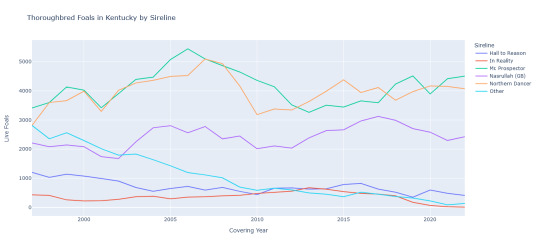
This is a bit off the normal focus of the blog (pretty pictures), but it's a bit of an interest of mine. Above is a chart of the number of thoroughbred foals born in Kentucky from different sire lines from 1999-2023. For example, the "In Reality" line shows the number of foals born by In Reality, or one of his sons, or one of his grandsons, etc.
It's striking how much the sire pool has narrowed to sons of Mr. Prospector, Northern Dancer, and Nasrullah (GB) (mostly through A. P. Indy but also with the Uncle Mos). While the overall foal crop has been shrinking, these sirelines have stayed constant - the decline in foal crop has come mostly from the disappearance of other sire lines. I'm sure there are caveats to this and things I haven't considered. For one, this doesn't look at where a particular sireline might show up in broodmares. But the next generation of broodmares can only come for these sirelines, right? (I'm not a geneticist, so if someone knows more about this I'm genuinely curious to know). Also, this is as far back as the Jockey Club has posted breeding statistics on the internet, so I don't know the extent to which there were similar contractions in the past. (It is worth noting that Mr. Prospector, Hail to Reason, Nasrullah, and Northern Dancer are all male-line descendants of Phalaris, who was foaled in 1913)
From the In Reality line: Bal A Bali (BRZ): 7, and Tourist: 2 (as a fan of Man o' War this is sad for me, as this is probably the end of his male line)
From all other lines: Mucho Macho Man: 27, Runhappy: 107, Skipshot: 3
I have some python scripts to put these charts together so if anyone has more questions/things they want to see let me know and I'll see if I can put some more charts together.
12 notes
·
View notes
Text
APRIL RESET



So in January I created some New Year’s resolutions. I just went a little crazy with it just for the fun of it. Next I created my first quarter goals for the first three months. So basically I have resolutions for the three months. Due to circumstances and events, to avoid feeling overwhelmed and like a failure, I wanted to break those goals down into daily habits.
Goal - Have my dream body:
Habits: booty/legs three times a week, upper body and abs two times a week, incorporate more protein in my meals, actually go out of my way to cook more meals instead of eating lazy meals.
Goal - Read at least 12 books
Habit: Read everyday, finish a book or two per week.
These are a few examples I have. For the month of April, I want to reflect on my first quarter goals and see how much I’ve accomplished and note any improvements I can make for the next quarter.
I actually accomplished reading 13 books for the first quarter which is actually surprising lol. I’ve been pretty consistent with my work outs. I had a few lazy weeks but I haven’t had a week where I didn’t work out at all! Pats myself on the back.
For the next three months, I want to work on these areas of my life:
Finances
My Home Environment
My Mental Health


I would usually use ChatGPT to give me some ideas on habits I can try to incorporate in my day to help with bettering these areas. However, it would just give basic ideas, oh well lol.
I create a habit tracker for each week and then do a week review to see how I did and how I can improve for the next week. Some habits I can have on my habit tracker in order to accomplish better outcomes in the three areas above are:
Educate myself on interior designing
Educate myself on Feng Shui
Meditate or do EFT tapping most days of the week
Take my Magneisum Glycinate supplement every night
Journal most days of the week
Complete the gratitude practice from The Magic by Rhonda Byrne
Practice Python and any other statistical programming language a few days of the week.
These are just a few I have on my mind but as the weeks go, I’ll probably come up with more and slowly incorporate them into my day.
Here’s to a WONDERFUL second quarter!


#femininity#high value woman#leveling up#elegance#hypergamy#affluence#luxury#goals#level up#divine feminine#goal setting#quarter goals#it girl#that girl#dream girl journey#dream self#glow up diaries#glow up journey#glow up#bullet journal#12weekyear#April reset#hot girls read#girlblogging#dream girl#high value mindset#pink pilates princess#pink pilates girl#hot and educated#women in stem
7 notes
·
View notes
Text
@girderednerve replied to your post coming out on tumblr as someone whose taught "AI bootcamp" courses to middle school students AMA:
did they like it? what kinds of durable skills did you want them to walk away with? do you feel bullish on "AI"?
It was an extracurricular thing so the students were quite self-selecting and all were already interested in the topic or in doing well in the class. Probably what most interested me about the demographic of students taking the courses (they were online) was the number who were international students outside of the imperial core probably eventually looking to go abroad for college, like watching/participating in the cogs of brain drain.
I'm sure my perspective is influenced because my background is in statistics and not computer science. But I hope that they walked away with a greater understanding and familiarity with data and basic statistical concepts. Things like sample bias, types of data (categorical/quantitative/qualitative), correlation (and correlation not being causation), ways to plot and examine data. Lots of students weren't familiar before we started the course with like, what a csv file is/tabular data in general. I also tried to really emphasize that data doesn't appear in a vacuum and might not represent an "absolute truth" about the world and there are many many ways that data can become biased especially when its on topics where people's existing demographic biases are already influencing reality.
Maybe a bit tangential but there was a part of the course material that was teaching logistic regression using the example of lead pipes in flint, like, can you believe the water in this town was undrinkable until it got Fixed using the power of AI to Predict Where The Lead Pipes Would Be? it was definitely a trip to ask my students if they'd heard of the flint water crisis and none of them had. also obviously it was a trip for the course material to present the flint water crisis as something that got "fixed by AI". added in extra information for my students like, by the way this is actually still happening and was a major protest event especially due to the socioeconomic and racial demographics of flint.
Aside from that, python is a really useful general programming language so if any of the students go on to do any more CS stuff which is probably a decent chunk of them I'd hope that their coding problemsolving skills and familiarity with it would be improved.
do i feel bullish on "AI"? broad question. . . once again remember my disclaimer bias statement on how i have a stats degree but i definitely came away from after teaching classes on it feeling that a lot of machine learning is like if you repackaged statistics and replaced the theoretical/scientific aspects where you confirm that a certain model is appropriate for the data and test to see if it meets your assumptions with computational power via mass guessing and seeing if your mass guessing was accurate or not lol. as i mentioned in my tags i also really don't think things like linear regression which were getting taught as "AI" should be considered "ML" or "AI" anyways, but the larger issue there is that "AI" is a buzzy catchword that can really mean anything. i definitely think relatedly that there will be a bit of an AI bubble in that people are randomly applying AI to tasks that have no business getting done that way and they will eventually reap the pointlessness of these projects.
besides that though, i'm pretty frustrated with a lot of AI hysteria which assumes that anything that is labeled as "AI" must be evil/useless/bad and also which lacks any actual labor-based understanding of the evils of capitalism. . . like AI (as badly formed as I feel the term is) isn't just people writing chatGPT essays or whatever, it's also used for i.e. lots of cutting edge medical research. if insanely we are going to include "linear regression" as an AI thing that's probably half of social science research too. i occasionally use copilot or an LLM for my work which is in public health data affiliated with a university. last week i got driven batty by a post that was like conspiratorially speculating "spotify must have used AI for wrapped this year and thats why its so bad and also why it took a second longer to load, that was the ai generating everything behind the scenes." im saying this as someone who doesnt use spotify, 1) the ship on spotify using algorithms sailed like a decade ago, how do you think your weekly mixes are made? 2) like truly what is the alternative did you think that previously a guy from minnesota was doing your spotify wrapped for you ahead of time by hand like a fucking christmas elf and loading it personally into your account the night before so it would be ready for you? of course it did turned out that spotify had major layoffs so i think the culprit here is really understaffing.
like not to say that AI like can't have a deleterious effect on workers, like i literally know people who were fired through the logic that AI could be used to obviate their jobs. which usually turned out not to be true, but hasn't the goal of stretching more productivity from a single worker whether its effective or not been a central axiom of the capitalist project this whole time? i just don't think that this is spiritually different from retail ceos discovering that they could chronically understaff all of their stores.
2 notes
·
View notes
Text
The Skills I Acquired on My Path to Becoming a Data Scientist
Data science has emerged as one of the most sought-after fields in recent years, and my journey into this exciting discipline has been nothing short of transformative. As someone with a deep curiosity for extracting insights from data, I was naturally drawn to the world of data science. In this blog post, I will share the skills I acquired on my path to becoming a data scientist, highlighting the importance of a diverse skill set in this field.
The Foundation — Mathematics and Statistics
At the core of data science lies a strong foundation in mathematics and statistics. Concepts such as probability, linear algebra, and statistical inference form the building blocks of data analysis and modeling. Understanding these principles is crucial for making informed decisions and drawing meaningful conclusions from data. Throughout my learning journey, I immersed myself in these mathematical concepts, applying them to real-world problems and honing my analytical skills.
Programming Proficiency
Proficiency in programming languages like Python or R is indispensable for a data scientist. These languages provide the tools and frameworks necessary for data manipulation, analysis, and modeling. I embarked on a journey to learn these languages, starting with the basics and gradually advancing to more complex concepts. Writing efficient and elegant code became second nature to me, enabling me to tackle large datasets and build sophisticated models.
Data Handling and Preprocessing
Working with real-world data is often messy and requires careful handling and preprocessing. This involves techniques such as data cleaning, transformation, and feature engineering. I gained valuable experience in navigating the intricacies of data preprocessing, learning how to deal with missing values, outliers, and inconsistent data formats. These skills allowed me to extract valuable insights from raw data and lay the groundwork for subsequent analysis.
Data Visualization and Communication
Data visualization plays a pivotal role in conveying insights to stakeholders and decision-makers. I realized the power of effective visualizations in telling compelling stories and making complex information accessible. I explored various tools and libraries, such as Matplotlib and Tableau, to create visually appealing and informative visualizations. Sharing these visualizations with others enhanced my ability to communicate data-driven insights effectively.

Machine Learning and Predictive Modeling
Machine learning is a cornerstone of data science, enabling us to build predictive models and make data-driven predictions. I delved into the realm of supervised and unsupervised learning, exploring algorithms such as linear regression, decision trees, and clustering techniques. Through hands-on projects, I gained practical experience in building models, fine-tuning their parameters, and evaluating their performance.
Database Management and SQL
Data science often involves working with large datasets stored in databases. Understanding database management and SQL (Structured Query Language) is essential for extracting valuable information from these repositories. I embarked on a journey to learn SQL, mastering the art of querying databases, joining tables, and aggregating data. These skills allowed me to harness the power of databases and efficiently retrieve the data required for analysis.

Domain Knowledge and Specialization
While technical skills are crucial, domain knowledge adds a unique dimension to data science projects. By specializing in specific industries or domains, data scientists can better understand the context and nuances of the problems they are solving. I explored various domains and acquired specialized knowledge, whether it be healthcare, finance, or marketing. This expertise complemented my technical skills, enabling me to provide insights that were not only data-driven but also tailored to the specific industry.
Soft Skills — Communication and Problem-Solving
In addition to technical skills, soft skills play a vital role in the success of a data scientist. Effective communication allows us to articulate complex ideas and findings to non-technical stakeholders, bridging the gap between data science and business. Problem-solving skills help us navigate challenges and find innovative solutions in a rapidly evolving field. Throughout my journey, I honed these skills, collaborating with teams, presenting findings, and adapting my approach to different audiences.
Continuous Learning and Adaptation
Data science is a field that is constantly evolving, with new tools, technologies, and trends emerging regularly. To stay at the forefront of this ever-changing landscape, continuous learning is essential. I dedicated myself to staying updated by following industry blogs, attending conferences, and participating in courses. This commitment to lifelong learning allowed me to adapt to new challenges, acquire new skills, and remain competitive in the field.
In conclusion, the journey to becoming a data scientist is an exciting and dynamic one, requiring a diverse set of skills. From mathematics and programming to data handling and communication, each skill plays a crucial role in unlocking the potential of data. Aspiring data scientists should embrace this multidimensional nature of the field and embark on their own learning journey. If you want to learn more about Data science, I highly recommend that you contact ACTE Technologies because they offer Data Science courses and job placement opportunities. Experienced teachers can help you learn better. You can find these services both online and offline. Take things step by step and consider enrolling in a course if you’re interested. By acquiring these skills and continuously adapting to new developments, they can make a meaningful impact in the world of data science.
#data science#data visualization#education#information#technology#machine learning#database#sql#predictive analytics#r programming#python#big data#statistics
14 notes
·
View notes
Text
How do I learn R, Python and data science?
Learning R, Python, and Data Science: A Comprehensive Guide
Choosing the Right Language
R vs. Python: Both R and Python are very powerful tools for doing data science. R is usually preferred for doing statistical analysis and data visualisations, whereas Python is much more general and currently is very popular for machine learning and general-purpose programming. Your choice of which language to learn should consider your specific goals and preferences.
Building a Strong Foundation
Structured Courses Online Courses and Tutorials: Coursera, edX, and Lejhro offer courses and tutorials in R and Python for data science. Look out for courses that develop theoretical knowledge with practical exercises. Practise your skills with hands-on coding challenges using accompanying datasets, offered on websites like Kaggle and DataCamp.
Books: There are enough books to learn R and Python for data science. You may go through the classical ones: "R for Data Science" by Hadley Wickham, and "Python for Data Analysis" by Wes McKinney.
Learning Data Science Concepts
Statistics: Know basic statistical concepts: probability, distribution, hypothesis testing, and regression analysis.
Cleaning and Preprocessing: Learn how to handle missing data techniques, outliers, and data normalisation.
Data Visualization: Expert libraries to provide informative visualisations, including but not limited to Matplotlib and Seaborn in Python and ggplot2 in R.
Machine Learning: Learn algorithms-Linear Regression, Logistic Regression, Decision Trees, Random Forest, Neural Networks, etc.
Deep Learning: Study deep neural network architecture and how to build and train them using the frameworks TensorFlow and PyTorch.
Practical Experience
Personal Projects: In this, you apply your knowledge to personal projects which help in building a portfolio.
Kaggle Competitions: Participate in Kaggle competitions to solve real-world problems in data science and learn from others.
Contributions to Open-Source Projects: Contribute to some open-source projects for data science in order to gain experience and work with other people.
Other Advice
Join Online Communities: Join online forums or communities such as Stack Overflow and Reddit to ask questions, get help, and connect with other data scientists.
Attend Conferences and Meetups: This is a fantastic way to network with similar working professionals in the field and know the latest trends going on in the industry.
Practice Regularly: For becoming proficient in data science, consistent practice is an indispensable element. Devote some time each day for practising coding challenges or personal projects.
This can be achieved by following the above-mentioned steps and having a little bit of dedication towards learning R, Python, and Data Science.
2 notes
·
View notes
Text
Is it possible to transition to a data scientist from a non-tech background at the age of 28?
Hi,
You can certainly shift to become a data scientist from a nontechnical background at 28. As a matter of fact, very many do. Most data scientists have actually shifted to this field from different academic and professional backgrounds, with some of them having changed careers even in their midlife years.

Build a Strong Foundation:
Devour some of the core knowledge about statistics, programming, and data analysis. Online classes, bootcamps—those are good and many, many convenient resources. Give it a whirl with Coursera and Lejhro for specific courses related to data science, machine learning and programming languages like Python and R.
A data scientist needs to be proficient in at least one or two programming languages. Python is the most used language for data science, for it is simple, and it has many libraries. R is another language that might come in handy for a data scientist, mostly in cases connected with statistical analysis. The study of manipulation libraries for study data and visualization tools includes Pandas for Python and Matplotlib and Seaborn for data, respectively.
Develop Analytical Skills:
The field of data science includes much analytics and statistics. Probability, hypothesis testing, regression analysis would be essential. These skills will help you derive meaningful information out of the data and also allow you to use statistical methods for real-world problems.
Practical experience is very important in the field of data science. In order to gain experience, one might work on personal projects or contribute to open-source projects in the same field. For instance, data analysis on publicly available datasets, machine learning, and creating models to solve particular problems, all these steps help to make the field more aware of skills with one's profile.
Though formal education in data science is by no means a requirement, earning a degree or certification in the discipline you are considering gives you great credibility. Many reputed universities and institutions offer courses on data science, machine learning, and analytics.
Connect with professionals in the same field: try to be part of communities around data science and attend events as well. You would be able to find these opportunities through networking and mentoring on platforms like LinkedIn, Kaggle, and local meetups. This will keep you abreast of the latest developments in this exciting area of research and help you land job opportunities while getting support.
Look out for entry-level job opportunities or internships in the field of data science; this, in effect, would be a great way to exercise your acquired experience so far. Such positions will easily expose one to a real-world problem related to data and allow seizing the occasion to develop practical skills. These might be entry-level positions, such as data analysts or junior data scientists, to begin with.
Stay Current with Industry Trends: Data science keeps on evolving with new techniques, tools, and technologies. Keep up to date with the latest trends and developments in the industry by reading blogs and research papers online and through courses.
Conclusion:
It is definitely possible to move into a data scientist role if one belongs to a non-tech profile and is eyeing this target at the age of 28. Proper approach in building the base of strong, relevant skills, gaining practical experience, and networking with industry professionals helps a lot in being successful in the transition. This is because data science as a field is more about skills and the ability to solve problems, which opens its doors to people from different backgrounds.
#bootcamp#data science course#datascience#python#big data#machinelearning#data analytics#ai#data privacy
3 notes
·
View notes